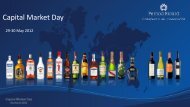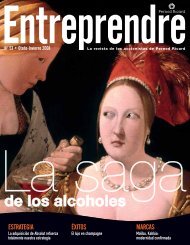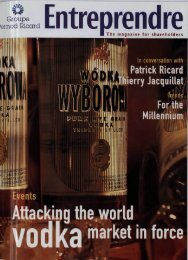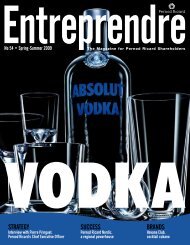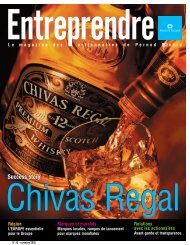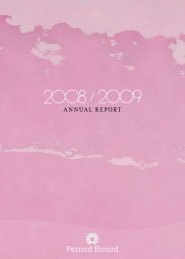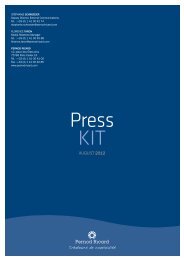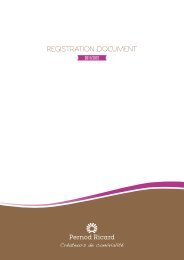Registration Document - Pernod Ricard
Registration Document - Pernod Ricard
Registration Document - Pernod Ricard
You also want an ePaper? Increase the reach of your titles
YUMPU automatically turns print PDFs into web optimized ePapers that Google loves.
Environmental management<br />
The Group’s environmental policy<br />
In line with the principles set out in its S ustainable D evelopment<br />
Charter, the Group applies responsible environmental policy in each<br />
country that is home to one of its production facilities. The main<br />
pillars of the policy are:<br />
◆ promoting the responsibility of subsidiaries: each subsidiary is fully<br />
responsible for determining how to reduce its own environmental<br />
PRESENTATION OF THE PERNOD RICARD GROUP 1<br />
Operation and strategy<br />
footprint and how to apply the Group’s policy locally. <strong>Pernod</strong><br />
<strong>Ricard</strong>’s Technical Division oversees and coordinates measures at<br />
Group level, notably by performing regular audits and notifying<br />
subsidiaries of best practices;<br />
the four-fold certification policy: in addition to the HACCP<br />
methodology extensively applied across the Group, in 2009 it<br />
decided to add the ISO 22000 standard on food safety to the three<br />
standards already applied, namely ISO 9001 (Quality), ISO 14001<br />
(Environmental Management) and OHSAS 18001 (Health and<br />
Safety). As of 30 June 2009, 93% of the volumes produced by the<br />
Group came from ISO 14001 certified sites.<br />
Standard ISO 9001 ISO 14001 OHSAS 18001 ISO 22000<br />
Area Quality Environmental<br />
Management<br />
Health & Safety Food Safety<br />
Number of sites (%) 88 81 70 13<br />
Volume produced (%) 97 93 78 10<br />
◆<br />
the Group’s Environment Action Plan: it is focused on four fundamental points and aims to achieve specific targets.<br />
Area 2012 targets<br />
Promote sustainable farming (local initiatives depending on environment)<br />
Save water resources (10)% (m3 per litre of finished product)<br />
Reducing energy consumption (10)% (kWh per litre of pure alcohol)<br />
Minimise the impact of waste and effluents 85% Recycled waste<br />
The sections that follow provide further details on the measures<br />
taken in the various areas.<br />
Promoting sustainable farming<br />
<strong>Pernod</strong> <strong>Ricard</strong> is a major agricultural partner, as all the Group’s<br />
products are manufactured with farm raw materials. As such, it<br />
promotes sustainable farming, using natural resources responsibly,<br />
respecting the environment, and is concerned about preserving water<br />
and soil quality, biodiversity and human health.<br />
In 2008/2009, direct purchases of agricultural products represented<br />
878,000 tonnes, mostly in the form of grain for distillation<br />
(505,000 tonnes) and grapes (360,000 tonnes).<br />
Including transformed products (alcohol, wines, sugar, aromatic<br />
plants and herbs, etc.), the Group buys about 2.5 million tonnes<br />
of agricultural products, representing the equivalent of around<br />
160,000 hectares of farmland.<br />
<strong>Pernod</strong> <strong>Ricard</strong> is committed to promoting sustainable farming, both<br />
in its own agricultural activities and the products it buys.<br />
As such, the Group follows stringent local standards:<br />
◆ in New Zealand, all the vineyards run by Montana are “Sustainable<br />
Wine Growing New Zealand” certified;<br />
◆ in Australia, Orlando Wines has undertaken to provide its major<br />
suppliers with training on the “Freshcare Environmental”<br />
standards and have them certified;<br />
◆ in France, the Martell and Mumm Perrier<br />
-Jouët vineyards are<br />
operated in compliance with the Guidelines on Best Practices<br />
(Guides de Bonnes Pratiques) drawn up by c ognac and c hampagne<br />
associations ;<br />
I REFERENCE DOCUMENT 2008/2009 I PERNOD RICARD 11<br />
◆<br />
◆ in Sweden, the Absolut Company is supplied exclusively with wheat<br />
produced locally, in line with stringent sustainable agriculture<br />
standards.<br />
Saving water resources<br />
A fragile element, specific targets<br />
Water is an essential component in the products manufactured<br />
by <strong>Pernod</strong> <strong>Ricard</strong>. It is used at every stage in the lifecycle of the<br />
Group’s products: irrigation of farmlands, cleaning of equipment,<br />
manufacture of grain-based eaux-de-vie, cooling of distillery facilities<br />
and adjustment of the degree of alcohol in whiskies, vodkas, brandies<br />
and rums.<br />
The pressure on this natural resource, unevenly distributed throughout<br />
the world and often under threat by human pollution, heightens every<br />
year. <strong>Pernod</strong> <strong>Ricard</strong> has therefore marked water management as one<br />
of its four strategic focuses in its environmental policy: the Group is<br />
targeting a 10% reduction in its water consumption per unit produced<br />
by 2012.<br />
To do so, each subsidiary must:<br />
◆ measure its consumption;<br />
◆ check that the water it uses does not endanger resources;<br />
◆<br />
take measures to save water;<br />
◆ ensure efficient treatment of waste water prior to release into the<br />
environment.<br />
These measures become even more necessary if the subsidiary is<br />
located in a geographical region where water is scarce. This is the<br />
case, for instance, in Australia and in Mexico.



